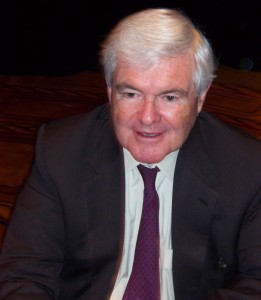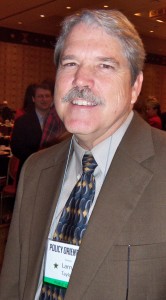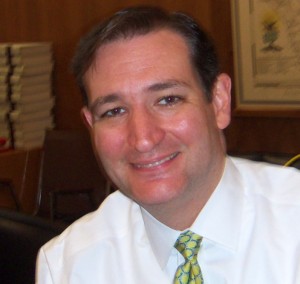Posts Tagged ‘Texas Public Policy Foundation’
Texas vs. California Roundup for February 6, 2013
Wednesday, February 6th, 2013Brief Impressions of the Texas Public Policy Foundation’s 2013 Policy Orientation
Monday, January 14th, 2013I enjoyed attending what little I could of the Texas Public Policy Foundation 2013 policy orientation held January 9-11. Here are a few quick and largely random impressions:
Because I just started a new day job, I wasn’t able to attend until Thursday evening, which meant I got to enjoy Austin’s lovely rush-hour traffic on Mopac and only got to hear about half of Ted Cruz’s pre-recorded message. (Cruz was originally scheduled to appear with Sen. John Cornyn, but had to fly off to Afghanistan and Israel on a Senate Foreign Relations trip. Cruz also appeared at lunch that day, a session I was unable to attend.) Then it was time for Texas’ senior U.S. Senator, John Cornyn, to be interviewed.
He defended the Fiscal Cliff deal as necessary to avoid a huge tax increase. He talked about the Senate’s inability to pass a budget. “Shame doesn’t work on Harry Reid.”
On foreign and defense policy, he noted (correctly) that keeping the American people safe is the number one responsibility of government. Cornyn says he’s opposing the nomination of Chuck Hagel and dinged Obama over Benghazi. “If the President and his Administration had been honest about Benghazi, they’re wouldn’t have been a scandal.” (Paraphrased.)
Cornyn also displayed a certain tone-deafness in regard to his audience. When asked to mention possible 2016 GOP Presidential candidates, the first name Cornyn mentioned was NJ Governor Chris Christie, which drew audible groans and hisses from the audience, for good reason.
After the Cornyn speech there was a blogger met-and-great at Rivals Steakhouse. I met a bevy of state Reps whose names quickly blurred together, as well as Ashley Sewell, AKA @TXTrendyChick, who I had already been following on Twitter, and a bunch of other bloggers. Most interesting bit of off-the-record gossip: Confirmation of my Rick Perry hopped-up on goofballs theory. “When I saw him running around Iowa in flats I knew he was in a lot of pain. The man practically sleeps in boots.”
On Friday, I took a long lunch to attend the Newt Gingrich luncheon and signing. I sat one seat down from the indefatigable Holly Hansen (who has her own, far more extensive coverage), and @TXTrendyChick promptly plopped down between us. Obviously our table was the place to be.
I get to hang out with all the cool chicks!
Lt. Governor David Dewhurst was Gingrich’s warm-up speaker. Dewhurst has improved somewhat since his losing Senate race against Ted Cruz last year, but he’s still not a natural speaker. He tries to cram too many policy points into a speech, and isn’t skilled enough to distinguish between major and minor points. When it comes to conservative policy, he seems to know the words, but doesn’t hear the music.
Dewhurst’s four points as to why Texas is doing better than any other state (1. We keep our spending low, 2. Keep our taxes low, 3. A light regulatory hand, and 4. Keep state government out of the way) were all very solid. He also promised additional budget cutting; let’s hope he follows through.
Most interesting parts of Dewhurst’s speech: A clumsily-phrased plea for welfare reform (“I’m not going to pay people to sit on the couch and do drugs,” a proclamation that will no doubt disappoint many members of Occupy Wall Street), and a proposal to arm teachers in the classroom.
Gingrich came on stage to a standing ovation. He said it was unfair for other states to compete with Texas, since we weren’t raising taxes and spending like California. (This is what people call “sarcasm.”)
This was definitely Gingrich 2.0 (or maybe 8.6), an idea-a-minute futurist (I’d like to see him and Bruce Sterling bounce off each other for a couple of hours someday). He was saying things about America 2.0, ubiquitous diagnostic cell phones as a health care initiative, having the programmers behind World of Warcraft come up with ways to teach our kids, and puters mkn kdz wrt btr (I iz skptical). It was even more scatter-shot than Dewhurst, but seemed a lot more organic. And he had one truly fascinating factoid: Students taking Stanford’s online classes did better on tests than the ones taking classes in person.
Gingrich seems genuinely optimistic about America’s future, which is a nice contrast with many of us after the 2012 election.
After the speech I managed to get him to sign two books for me, To Renew America, and Jim Wright’s Reflections of a Public Man, which he was quite amused by.
A few more luminaries:
A very dapper Chuck DeVore. He wasn’t born in Texas, but he got here as quickly as he could.
Apologies to anyone I didn’t mention, didn’t run into, or didn’t get a picture of (some just didn’t come out well). It was a busy two days!
And congratulations to TPPF honcho David Guenthner and his many minions, for all the hard work in carrying this off:
In addition to the copy of Texas Got it Right handed out to everyone, David thrust a copy of DeVore’s The Texas Model: Prosperity in the Lone Star State into my hands. Hopefully I’ll have a chance to say more about both in the not-so-distant future.
Texas Beats EPA Again: Cross-State Pollution Rules Struck Down
Tuesday, August 21st, 2012“A federal court has struck down an Environmental Protection Agency rule that forces cuts in soot- and smog-forming power plant emissions that cross state lines, dealing a major blow to the White House’s air quality agenda. The U.S. Court of Appeals for the District of Columbia Circuit vacated the Cross-State Air Pollution Rule.”
This is great news for Texas, as the original rules could have resulted in Texans dying during the height of summer due to shutting down existing Texas power plants before new ones had come online. Those rules had already been stayed early this year, but have now been struck down entirely.
From the news stories, it’s unclear whether the Obama Administration’s EPA will appeal the ruling to the Supreme Court.
Edited to add: TPPF now has a memo up celebrating the ruling. For once I was ahead of them!
TPPF Conference Call on the ObamaCare Decision
Thursday, June 28th, 2012Just got off a Texas Public Policy Foundation conference call with Chuck DeVore and Arlene Wohlgemuth on the effects of the Supreme Court ObamaCare decision. Just in case you hadn’t read anything on the Internet today, that ruling was 5-4 affirming ObamaCare as constitutional, majority opinion written by Chief Justice Roberts, not on Commerce Clause grounds, but on congress’ ability to tax:
The Affordable Care Act is constitutional in part and unconstitutional in part. The individual mandate cannot be upheld as an exercise of Congress’s power under the Commerce Clause. That Clause authorizes Congress to regulate interstate commerce, not to order individuals to engage in it. In this case, however, it is reasonable to construe what Congress has done as increasing taxes on those who have a certain amount of income, but choose to go without health insurance. Such legislation is within Congress’s power to tax.
Here some no-doubt random bits of information I gleaned from the conference call:
This TPPF policycast also covers some of the same topics discussed on the conference call.
So: That’s my brief recap of the conference call. I’m still digesting the ruling itself, and reactions to the ruling. I might be doing that for some time…
BattleSwarm Blog Endorses Ted Cruz for United States Senator
Monday, April 30th, 2012Lawrence Person’s BattleSwarm Blog endorses Ted Cruz for United States Senator. I believe that Cruz is the best candidate, that he has the longest, strongest, and deepest commitment to conservative principles among all the candidates running, and that he will make the best United States Senator for Texas.
Because I strive to be both fair and clear, I want to discuss the strengths and weaknesses of all the other Republican candidates in the race, and why I believe Ted Cruz is the superior choice for Senator.
Let’s dispense with the candidates that didn’t run serious campaigns: Dr. Joe Agris never bothered to even put up a website and never campaigned beyond an event appearance or two; I can only assume his run is a way to advertise his medical practice. Ben Gambini did little better, only managing a Facebook page and a few events. Curt Cleaver at least made some effort, but not enough to make an impression,
Lela Pittenger ran a semi-serious campaign, raising some money and appearing at numerous events, but I always got the impression that she was running more for ego than to take principled positions at odds with the more prominent candidates. Plus I never got the impression she put in the sustained effort into the nitty gritty, unglamorous work that a real longshot candidate has to in order to have any chance of succeeding.
With all but one of the longshots dispensed with (we’ll get to him further down), let’s turn to the major candidates.
Given how heavily favored he was coming into this race, it’s shocking how poor a job Lieutenant Governor David Dewhurst has done campaigning.
To be sure, Dewhurst has many strengths, but two of his strongest (name recognition and personal wealth) play no role in my deciding who to endorse. And while I’m impressed with his U.S. Air Force service and his business acumen in amassing a $200+ million fortune, both of those attributes must take a very distant backseat to his decade-long record as Lt. Governor.
Some of Dewhurst’s record is worthy of praise. While other state governments have spent money like drunken sailors in a Thai whorehouse using George Soros’ stolen credit card, Texas, under Governor Rick Perry and Lt. Governor Dewhurst, has generally controlled spending, has balanced the budget without raising taxes (though some of that has been accomplished through gimmicks), and actually reduced the state budget for the 2012-2013 biennium compared to the 2010-2011 budget. What share of credit does Lt. Governor Dewhurst take for this achievement? A fair amount. While constrained both by the overall direction of the Governor’s Office of Budget, Planning, and Policy, and by the Comptroller’s revenue estimates, the Lt. Governor has considerable control over the process by virtue not only of his oversight of the day-to-day affairs of the state senate, but also his ability to essentially pick half the seats on the Legislative Budget Board, which has a large hand in establishing and managing budget priorities.
This, and his efforts at shepherding through the (constitutionally required) 2003 redistricting are among the primary reasons Dewhurst has been considered a conservative. And I have defended Dewhurst from charges he was a RINO in the past. Dewhurst occupies that vast gray area between real RINOs such as Arlen Specter and Charlies Crist and true movement conservatives; call him a “big business Republican,” the sort of guy who will defend the free market 90% of the time, but won’t let anything like principles stand in the way of doing favors for well connected friends. (That would also explain why, though he has mostly contributed to Republican candidates, he did make two donations to Democratic Senator Lloyd Bentsen.) I fear that Dewhurst is probably the most amenable of all the candidates of signing on with the sort of “grand compromise” that gets praised by the press for selling out conservatives rather than fighting to shrink the size and scope of the federal government.
There’s been real dissatisfaction with Dewhurst among movement conservatives for years. Despite having controlling majorities in both House and Senate, conservative Republicans found their agenda being thwarted in many ways great and small by Dewhurst in the Senate and Speaker Joe Straus in the House:
All this was bad enough, but his lackluster campaign and poor public speaking skills have given even more reasons for voters to look elsewhere. The Cruz campaign was right to ding Dewhurst for his repeated failures to show up at numerous candidate debates and forums across the country, but the Belo debate went a long way toward showing why exactly why Dewhurst has been avoiding such events: He’s not a good debater, he doesn’t seem to think quickly on his feet, and he seemed to grow worse and more confused as the night went on. Frankly, he didn’t seem up to the job.
Then there’s the issue of his indifference or even hostility to both new media and grassroots conservative activism. The fact that Dewhurst was the only major Republican senate candidate not only unable to find time to sit down for an interview for this blog, but whose campaign even failed to even respond to repeated requests, is only a minor concern (after all, people are busy). But it’s emblematic of the larger issue of Dewhurst’s indifference to new media, the Tea Party, and voters. You can bash Obama failures all day, but that won’t make you stand out from any other Republican candidate in the entire country. Dewhurst is an insider, establishment Republican who seems to have made zero effort to reach out to Tea Party voters.
This quote from Tea Party 911 blogger Barry Schlech neatly encapsulates what many Texas conservatives think about Dewhurst:
There is not a lot of tea party support for Mr. Dewhurst because of his more liberal Republican views. He has probably sensed this animosity since he has been unavailable for or a “no-show” at many of the tea party events to which he was invited. He is seen, by many, to represent the “good ol’ boy moderate to liberal Republican establishment that is well entrenched in Austin. He is seen as a close ally to House Speaker Joe Straus whom the tea party does not respect. Many tea partiers are not happy with this liberal Republican clique in Austin and want to change to a more representative and more conservative legislature.
All that said, David Dewhurst has some real strengths. He’s good at making and cultivating business and cultural connections, good at managing the intricacies of the legislative agenda, good at finding compromises and building consensus, and good at the backslapping minutia of legislative interpersonal relationships. Unfortunately, those are precisely the qualities I’m not looking for in my Senator. I don’t want a negotiator, I want a conservative fighter. I want someone to fight for shrinking the size and scope of the federal government and reign in insanely bloated federal spending, not manage it better. There are quite enough get-along-to-go-along compromisers in the senate already; we don’t need another one.
There are no areas in which I think David Dewhurst would do a better job than Ted Cruz in the Senate, but many in which I think he would perform markedly worse.
Speaking of people who I just don’t think are up to job, let’s talk about Craig James. James has a lot of strengths: he’s handsome, charismatic, personable, and has done very well for himself in his post-NFL business career. Politically James’ heart seems to be in the right place, he seems considerably more authentic and less calculated than Dewhurst, and his decision to release several years of his own tax returns was a savvy move for increased transparency the other candidates were forced to emulate. James seems to have awakened politically to the numerous problems facing the nation and how far we’ve drifted from a constitutional republic of enumerated powers. That’s a great first step on your political journey.
Unfortunately, the next step in that journey is not “Run for the United States Senate.” The second step is to read widely, broadly and deeply of both classic and modern political thought. The Constitution and The Bible are great first steps, but you should also read The Federalist Papers and Democracy in America and The Wealth of Nations and The Road to Serfdom and Economics in One Lesson and The Gulag Archipelago and The Black Book of Communism and Darkness at Noon and Up From Liberalism and Conscience of a Conservative and Losing Ground and Liberal Fascism and, yes, Atlas Shrugged, even if you object to Ayn Rand’s anti-religious bias. Start there, keep reading, and soon you’ll have the intellectual underpinnings to deepen and articulate your views. (It would also help you get beyond the irritatingly vague and platitudinous nature of your answers on any issues that go beyond your standard talking points.)
James doesn’t have that intellectual depth yet, and the fact that he hadn’t even heard of the Posse Comitatus Act is emblematic of his inexperience. His problems are compounded by his late start and his background. If you start out as a professional football player and then move into sports broadcasting, you’re going to have to work twice as hard to convince people that you have the intellectual acumen to run for public office. (Jack Kemp worked very hard at establishing his policy credentials.) James’ problem is compounded by his unwise decision to declare he was living on “Real Street” as his campaign’s central rhetorical motif. Craig, you were a professional football player and broadcaster. It doesn’t matter how many mayonnaise sandwiches you ate in your hardscrabble youth, the voting public at large is never going to believe an ex-NFL player/broadcaster is living on “real street,” no matter how hard you try or how many jobs you create as a businessman. Give it up.
Craig James isn’t ready to be Senator. Could he “skill up” to be electable a few years down the road, once the Texas Tech controversy has faded? Very possibly, though more likely at the congressional than senatorial level. (Let’s face it, when the bar starts at Sheila Jackson Lee, there are few non-incarcerated Republicans that aren’t up to the task.)
I’ll give this to Tom Leppert: When this campaign started, I really didn’t see myself ranking him higher than just about any of the declared candidates (which at the time included Roger Williams, Michael Williams, and Elizabeth Ames Jones) or Dewhurst. Leppert is intelligent, he’s dogged, he’s a very good one-on-one retail politician, he doesn’t make many mistakes, he’s assembled a campaign team second only to Cruz’s in their competence and grasp of new media, and he has much better stage presence than Dewhurst.
So given all that, and Leppert’s solid conservative policy positions on a wide range of issues, why doesn’t he rank higher? Mainly because until October 13, 2010, when Leppert endorsed Rick Perry in the gubernatorial race, Leppert gave absolutely no public sign that he was even a Republican, much less a conservative Republican. Before he started running for mayor, Leppert was just another rich guy whose campaign contributions went to people on both sides of the aisle, including contributions to Democrats like Texas Senate candidate Ron Kirk in 2002, Hawaii’s incumbent Senator Daniel K. Inouye in 1992 and again in 1998, and congressional contender (and later Honolulu mayor and member of Bloomberg’s gun-grabbing Mayors Against Illegal Guns Coalition) Muliufi Francis Hannemannin in 1990.
While running for mayor of Dallas in 2007, Leppert:
When he first ran for Mayor, as a moderate and a supporter of working men and women, he was pro-SEIU, pro-public employees organizing, pro-collective bargaining.
So committed to these ideals was Tom, that he vigorously pursued SEIU’s endorsement.
So committed to these ideals was Tom, that he came to our union organizing launch in the Water Department — encouraging folks to join SEIU.
So committed to these ideals was Tom, he frequently threw on an SEIU T-shirt and came to our union hall.
So committed to these ideals was Tom, that he wrote a letter of support to Senator West and testified in favor of SEIU members getting a form of collective bargaining.
Tom even signed an SEIU membership card!
Now, that Tom wants to compete in a Republican primary, he has renounced his support of unions and even has the gall to declare he “has expanded the Right to Work.”
And that’s just while running for mayor. His record as Mayor of Dallas has just as many question marks on both conservative and good governance grounds:
And there are at least two or three other big question marks about Leppert’s term as mayor. Indeed, one sign of how controversial that term was is how rarely he talks about it on the campaign trail, where he puts his business background first and foremost, as though his four years as mayor of Texas’ third largest city never happened.
The least charitable explanation for Tom Leppert’s behavior is that he’s a pure political animal with no core ideological beliefs other than being elected. The most charitable explanation is that he’s been a “secret conservative” all along, and was just waiting for the opportunity to proclaim to the world what he actually believes. My own suspicion is that he, like Dewhurst, fits neatly into the “get along to go along” establishment Republican mold. Like Dewhurst, I doubt Leppert would be notably more conservative as a senator than the departing Kay Baily Hutchison. That’s not good enough.
But even if he were a “secret conservative” all these years, why would I prefer him to someone like Ted Cruz who’s never been afraid to proclaim and defend conservative principles throughout the entirety of his career?
So that takes care of all the major candidates besides Cruz. But there’s still one candidate we haven’t covered. If I weren’t voting for Cruz, I would probably cast my vote for Glenn Addison.
Though a relative unknown, Addison has probably worked harder than any other candidate on the campaign trail, he’s well-spoken with a certain folksy charm, and he’s run a serious campaign in every aspect except funding. With his energy and effort, he could easily be a successful candidate in a down-ballot race.
Addison has staked out strong conservative positions on just about every issue, but there are a few I disagree with. I oppose his desire to sanction China for currency manipulation (protectionism is still loser economics). His evidently friendliness with the John Birch Society (there’s a reason William F. Buckley, Jr. felt compelled to cast them out of the respectable ranks of the conservative movement) is not a plus. And the few areas that I do prefer his policies over Cruz (eliminating the EPA and the Departments of Education and Energy, for example) are ones which have absolutely no chance of being passed in the near future. Which doesn’t mean they shouldn’t be pushed for…
If Ted Cruz were not in the race, I would vote for Addison knowing that he would probably be creamed by Dewhurst.
Fortunately, Ted Cruz is in the race.
Early on there was debate whether Cruz or Michael Williams was the best Tea Party candidate for the seat. Cruz won that “Tea Party Primary” so decisively that Williams dropped out. Not only is Cruz the unquestioned Tea Party representative, he is the one with the broadest and deepest conservative background. While the phrase “Ivy League Trial Lawyer” is technically accurate, you don’t specialize in 9th and 10th Amendment studies because you want to be rich, and you don’t work at the Texas Public Policy Foundation if you want moderate Republicans to consider you one of their own. Cruz is not only exceptionally sharp, an excellent debater and a gifted public speaker, he’s also a classic fusionist candidate with both strong free market and social conservative credentials, and fits the definition of the rightmost electable candidate in the race.
Don’t buy the MSM consensus wisdom that Dewhurst is invulnerable because he’s rich. There are lots of “unbeatable” politicians who have been knocked off by lesser-known challengers. Ed Koch was a shoe-in for Governor of New York until he ran into Mario Cuomo. Charlie Crist was going to mop the floor with Marco Rubio until he didn’t. George H. W. Bush looked invulnerable heading into 1992. Despite Dewhurst’s numerous advantages, he hasn’t been able to poll above 50% and Cruz has been steadily eating into his lead. I’ve had relatives who aren’t nearly as politically aware as I express unbidden how impressed they are with Cruz. The grassroots excitement about Cruz is not only palpable here in Texas, but among conservative and Tea Party organizations across the country, with conservative senate stalwarts like Jim DeMint and Rand Paul eager to help Cruz join their ranks.
I believe Ted Cruz is far and away the best best candidate in the race, and I urge all my Texas readers to cast their votes for him as the next United States Senator from Texas in the Republican primary.
Interview With Mario Loyola on the Constitutionality of ObamaCare
Tuesday, March 27th, 2012Given his background as both Solicitor General and a former fellow at the Texas Public Policy Foundation‘s Center for Tenth Amendment Studies, I was hoping to provide a mini-interview with Ted Cruz on the constitutional issues surrounding ObamaCare, but so far he has been too busy on the campaign trail to get back with answers. Fortunately, the current TPPF Center for Tenth Amendment Studies Director (and frequent National Review contributor) Mario Loyola was able to step up and answer some of the same questions.
My questions are in italics.
1. In the ObamaCare case the Supreme Court agreed to review, Florida vs. U.S. Health Department, Judge Roger Vinson ruled both that the individual mandate was not constitutional, and that ObamaCare was not severable, i.e. if any part of the law was ruled unconstitutional, all of it was unconstitutional. The 11th Circuit agreed that the individual mandate was unconstitutional but partially reversed Vinson by saying that it was severable from the rest of ObamaCare. Are the various clauses of ObamaCare severable, and have the courts previously ruled on the severability of law where no such severability was enumerated in the original statute?
The chief modern Supreme Court case on severability is Alaska Airlines v. Brock (1987), which held that when one part of a law is found to be unconstitutional, the remainder will be upheld if (1) it will be “fully operative” as a law, unless (2) it is evident that Congress would not have enacted the remainder without the invalid part. In our Supreme Court amicus curiae brief on this issue, we argue that the Court should conduct a thorough analysis of statutory interactions, in order to understand how the insurance “reforms,” Medicaid expansion, and premium subsidies (essentially, Titles I and II of the ACA) were all interrelated with the individual mandate in the original legislative bargain. Without the mandate, these other provisions will not function as Congress intended and would never have passed.
For example, at the heart of the ACA is its provision for “guaranteed issue” of health insurance, which requires health insurance companies to provide insurance for all applicants regardless of health status. In a pure “guaranteed issue” scenario, healthy people have an overwhelming incentive to drop their health insurance and wait until they are sick to get it. As healthy people leave the rolls, the per-unit cost of insuring the remaining pool of (riskier) insured rises, which pushes premiums up, which in turn drives more healthy people off the rolls. In the end, the only people who enroll are those who are actually sick, such that premiums approach the actual cost of health care. Under such a scenario, the insurance industry eventually collapses. The mandate is designed to prevent this adverse selection spiral by forcing everyone to have health insurance. Without the mandate, the insurance reforms won’t function as intended, and the resulting law is one that Congress never would have passed.
2. Do recent cases like U.S. vs. Lopez and Seminole Tribe vs. Florida indicate that the Roberts Supreme Court has retreated from the high water mark of expansive interpretation of the Commerce Claus in Wickard vs. Filburn?
Lopez punctured the common perception after Wickard that Congress could regulate whatever it wanted. But Lopez unfortunately embraced the logic of Wickard, and thus did little to restore the pre-New Deal balance. Lopez stands for little more than the nearly naked assertion that the commerce power must have some limit, and even that modest proposition is almost impossible to square with Wickard.
The difficulty for the Court here is that Wickard’s central doctrine – that Congress can regulate purely intrastate or non-commercial activity so long as it has “substantial effects” on interstate commerce – has no logical stopping point. If the federal government can regulate any class of activity with a “substantial effect” on interstate commerce, it can regulate virtually all activity. The Supreme Court is unlikely to use this case as an opportunity to overturn Wickard, but it shouldn’t extend such a flawed precedent into the wholly unprecedented arena of forcing individuals to engage in certain activities in order to conscript them into the service of a federal regulatory scheme.
3. From at least Lopez onward, Justice Clarence Thomas has been one of the leading voice for both constitutional originalism in general, and of a less expansive reading of the Commerce Claus in specific. Do you think his arguments have influenced judicial thinking in general, and his fellow Supreme Court justices specifically?
Justice Thomas has been the most consistent of the justices in adhering to originalism as a method of interpreting the Constitution. If you look at Jan Crawford Greenberg’s book Supreme Conflict, it’s clear that Thomas’ convictions have affected the other justices, particularly the other justices among the Court’s so-called conservative block.
4. Justice Anthony Kennedy is often considered the “swing vote” on the Supreme Court. Do you think Kennedy is receptive to constitutional originalism in general or a less expansive interpretation of the Commerce Claus specifically?
The important thing to understand about Justice Kennedy here is that he is at heart a federalist. He is very concerned about maintaining the Constitution’s system of dual sovereignty and is skeptical of federal actions that encroach on traditional state prerogatives. You can see this in his concurrence in Lopez, as well as in his other writings. As Justice Kennedy notes in Lopez, democracy can only function if elected representatives are accountable to the people. When the federal government impinges upon areas that have been traditionally left to the states, this undermines democratic accountability by clouding the issue of who is ultimately responsible for a given law.
Thanks to Mr. Loyola (and to TPPF) for taking the time out of his busy schedule to answer these questions. Yesterday I linked to his primer on the issues. Here’s Loyola, Richard Epstein, and Ilya Shapiro (talk about your legal power trios!) on why the individual mandate is not severable from the rest of ObamaCare.
Blogroll Addition: The Texas Public Policy Foundation
Monday, March 26th, 2012Today I added The Texas Public Policy Foundation to the blogroll. TPPF is the leading Texas think tank on both state and national issues, including the budget, education, and ObamaCare. Take, for example, this piece by Mario Loyola explaining why the individual mandate cannot be separated from the rest of ObamaCare.
In addition to Loyola, TPPF has snagged an impressive array of fellows, including Richard Epstein, Arthur Laffer, and William Murchison, among many others. (Current Texas Senate candidate Ted Cruz also worked at their Center for Tenth Amendment Studies.)
If you care about the deeper implications of today’s policy controversies, the work TPPF is producing is well worth your time and attention.
Texas Public Policy Foundation Snags Richard Epstein
Friday, March 9th, 2012The Texas Public Policy Foundation announced that legal scholar Richard A. Epstein was joining them as a Senior Fellow at the Foundation’s Center for Tenth Amendment Studies.
That’s a terrific pickup for them. Epstein is on a very short list of the very most important conservative legal scholars in the country. His book Takings (which, I must confess, I still haven’t read) is widely regarded as the most comprehensive legal exegesis of why the New Deal is unconstitutional. I think Epstein (like Mario Loyola and Ted Cruz) will find the Center for Tenth Amendment Studies an ideal place to further his research.
Congratulations to TPPF for a very solid addition to their already impressive array of scholars.
Texas Senate Race Update for January 20, 2012
Friday, January 20th, 2012Still waiting on Q4 fundraising numbers from the candidates. In previous quarters they came out around the 15th of the month after the deadline, but maybe the deadline is longer for End-of-Year reports.
TPPF Texas Senate Debate Roundup and Video, Plus A Few Other Race Tidbits
Monday, January 16th, 2012I was busy with a family even over the weekend, so I haven’t had a chance to sit down and watch the debate all the way through. But I’ll go ahead and put it up for others to take a gander at (Hat tip: The Right Side of Austin). Be aware that the debate doesn’t actually start until over an hour into the video. I’ve heard of long intros, but that’s ridiculous…
I’ll save my own comments until I get a chance to watch the whole video.
Here’s a live blog of the debate.
The Cruz campaign sent out a list of links, and rather than link all of them and claim them as my own, I’ll just direct you thataway.
One link they didn’t send out was this review over at Big Jolly Politics, where he gave James, Addison and Dewhurst As, Cruz a B, and Leppert a C.
Kathleen McKinney ranked it Cruz first, James second, and Leppert last (“Not a lot of flash there”), though her overall impressions of all were positive.
In other Senate race news:








